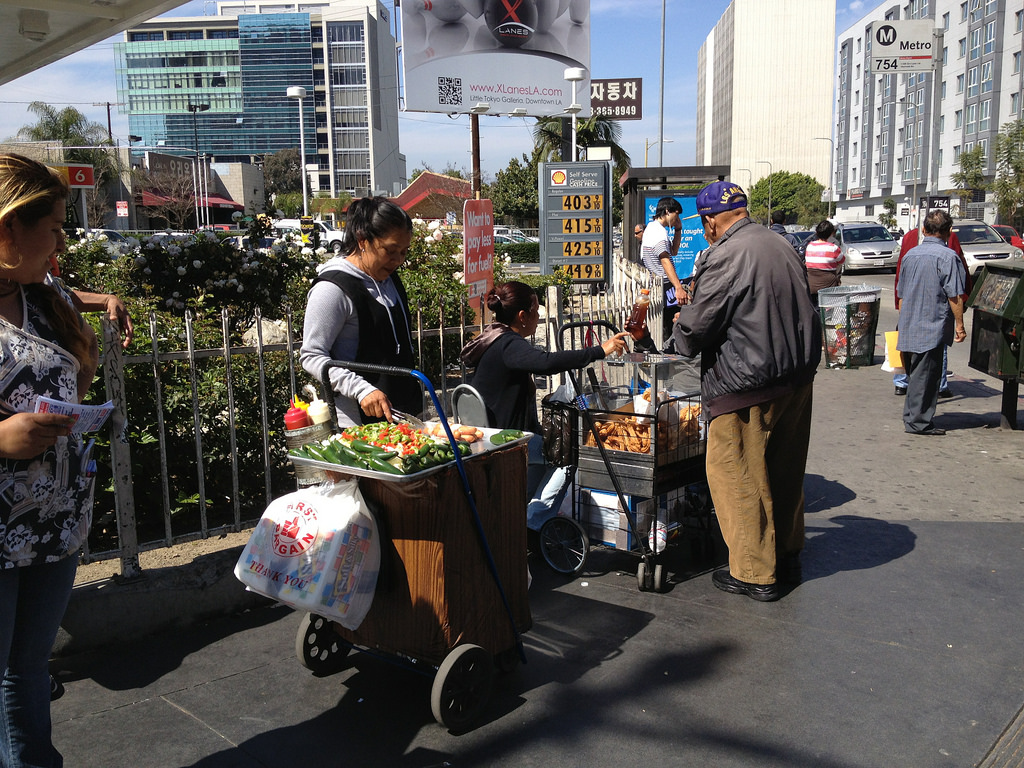Last February, prodded by immigrants’ rights activists, the Los Angeles City Council voted unanimously to decriminalize street vending. Commendably, our City’s leaders determined that they would not play handmaiden to the Trump administration and facilitate the deportation of undocumented street vendors by continuing to mete out criminal penalties for sidewalk vending.
Nearly a year later, and months behind schedule, however, the city’s estimated 50,000 street vendors languish in frustrated uncertainty and operate in a legal purgatory of sorts, subject to administrative citations and exorbitant fines.
While public statements by members of the City Council this past year seemed to indicate an intent to create a workable street vending policy, those statements have been belied by more recent reports that the city is moving forward with a proposal that would grant brick-and-mortar businesses blanket authority to ban vending on public sidewalks outside their doors.
This proposal is undemocratic, unwise, and almost certainly unconstitutional twice over. With respect to the law, the proposed delegation of untrammeled discretion to private businesses runs headlong into the longstanding prohibition that a legislative body’s authority to make fundamental policy decisions (including the power to regulate municipal streets and sidewalks) may not be handed over to private actors carte blanche. While state constitutional law permits regulatory regimes that enlist businesses in the enforcement of already-legislated rules, it does not allow businesses to make the rules themselves.
This distinction between enforcing and making rules, observed by the California Supreme Court in 1937, makes sense. The first principle of our democracy is that the power to make law derives from the people. Accordingly, only the people or their representatives can exercise it. Enforcing the law, by contrast, is a secondary power usually vested in the executive branch by institutional necessity. And redistributing that power for practical purposes to other actors is commonplace. But by empowering brick-and-mortar stores to not just enforce but also effectively set land use policy on their block, the proposal goes too far and enables private actors with pecuniary interests in shutting down street vending (or worse: extorting vendors for the right to use public space) to usurp the legislative power for their own gain.
Separately, the proposal may also amount to a discriminatory classification that penalizes vendors based entirely on whether they can obtain permission to operate from brick-and-mortar establishments. Such discrimination bears no rational relationship to any legitimate governmental interest beyond economic protectionism—neither alleviating congestion, nor improving circulation, nor ensuring pedestrian safety, for example. Indeed, a California appellate court reached this same conclusion in 1979, when it struck down as unconstitutional a similarly protectionist Los Angeles ordinance that prohibited the operation of food trucks within 100 feet of a restaurant, finding the ordinance constituted an arbitrary and “naked restraint of trade.”
As a matter of policy, the proposal is also deeply flawed. At a time when our city’s middle class is being hollowed out, housing costs are skyrocketing, and our job market is increasingly characterized by a sharp divide between high-skill positions and minimum-wage jobs with few or no benefits, it is unimaginable that the city would so obviously imperil the entrepreneurial energies of small businesses like street vendors by subjecting their viability to the whims of their nearest competitor. These small businesses enliven our streetscapes and embody what the Times’ celebrated food critic Jonathan Gold has called the “miracle of entry-level capitalism.” To be sure, these vendors embark on admirable and courageous journeys of upward mobility. Some, like Guerrilla Tacos’ Wes Avila, have emerged among the country’s most celebrated chefs. But most importantly, vending generates wealth that gets reinvested in neighborhoods that see too little of it.
How the city addresses street vending ultimately strikes at the very idea of what Los Angeles ought to be. Is this a place where anyone who works hard can carve out a rewarding life with opportunities for their children—a city of strivers, animated by a relentless creative energy—or a playground for the rich and well-connected? Are we a community that truly cares about immigrants—one that wants newcomers to not only survive but thrive—or a people content to shift from a posture of intolerance to one of indifference? Our city’s leaders can try to pass the buck on street vending to private businesses, but they cannot duck responsibility for the consequences of that judgment. If the City Council follows through on this element of its proposal, we will know where they stand.
Salvador E. Pérez is a government and regulatory attorney in the Los Angeles office of Manatt, Phelps & Phillips LLP. Adam S. Sieff is a constitutional and commercial litigator in the Los Angeles office of Latham & Watkins LLP, and Executive Vice Chair of the American Constitution Society for Law & Policy. The opinions expressed are theirs alone.






